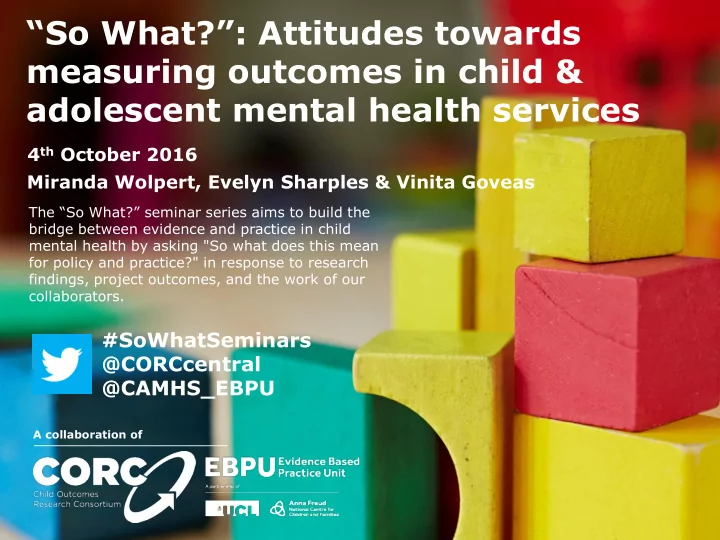

“So What?”: Attitudes towards measuring outcomes in child & adolescent mental health services 4 th October 2016 Miranda Wolpert, Evelyn Sharples & Vinita Goveas The “So What?” seminar series aims to build the bridge between evidence and practice in child mental health by asking "So what does this mean for policy and practice?" in response to research findings, project outcomes, and the work of our collaborators. #SoWhatSeminars @CORCcentral @CAMHS_EBPU A collaboration of
Evidence Based Practice Unit (EBPU) Research Gap 2 How would you describe your role? Go to www.menti.com and use the code 81 84 76 Results
Evidence Based Practice Unit (EBPU) Research Gap 3 Research Gap Disparity between policy recommendations and the use of outcome measures in clinical practice. Clinicians may hold a generally positive attitude towards outcome measures, but still feel that they do not help to improve patient care. Clinicians have reported not using data from measures in treatment planning or monitoring even when they had access to them. SO WHY IS THIS?
Evidence Based Practice Unit (EBPU) Methodology 4 Methodology The interview schedule was designed to explore clinicians’ attitudes towards outcome measures 9 semi-structured interviews Interviewees had a spread of 7 separate job roles between them Inductive thematic analysis
Evidence Based Practice Unit (EBPU) The interviews Needed to get involved in research project as part of child psychiatry training Interested in service development First proper involvement in research Showed challenges of doing research involving clinicians Known to interviewees. Variety of clinicians Following IAPT journey
Evidence Based Practice Unit (EBPU) Findings 6 Findings Two levels of implementation emerged: Service Level; implementation of outcome measures across a service to inform service improvement Session Level; implementation of outcome measures within individual clinical sessions
Evidence Based Practice Unit (EBPU) Findings 7 Standardisation ‘evidence -based ’ (Clinician 1) ‘ meeting the targets in terms of data reporting’ (Clinician 7 ) ‘ one-size-fits-all approach’ (Clinician 4) ‘we have to do them regardless of whether we feel they are helpful or not’ ( Clinician 5) ‘ risks somewhat alienating clients’ (Clinician 3 ) ‘like a tick -box exercise, I am not really interested in what they show’ (Clinician 7)
Evidence Based Practice Unit (EBPU) Findings 8 Training ‘ enthusiasm and meaning’ (Clinician 8 ) ‘strong supervision structure… to look at the graphs lot and to monitor the ratings’ (Clinician 6 ) ‘flurry’ of activity ‘sort of dies all over again’ (Clinician 9) ‘it’s a natural part of my clinical practice now’ (Clinician 1)
Evidence Based Practice Unit (EBPU) FIndings 9 Practical Experience ‘anxieties about how the data might be used’ (Clinician 2) ‘an easier thing to talk about’ (Clinician 4 ) allowing patients ‘to be active in their own treatments ’ (Clinician 2) ‘ helps people feel really taken seriously ’ ( Clinician 8)
Evidence Based Practice Unit (EBPU) Presentation or section title here 10 Resources ‘I think we lost a lot of people because we kept changing systems’ (Clinician 2 ) ‘ a disconnect between the clinical work and the data of measures ’ (Clinician 7) ‘autonomy is taken away from us in the sense that they are routinely sent out by the service before we’ve seen them’ (Clinician 1 ) ‘collecting an outcome on some kind of questionnaire and sticking it in a pile to be uploaded by an administrator in about six months’ time, it is really rather pointless’ (Clinician 7)
Evidence Based Practice Unit (EBPU) Audience participation 11 Mentimetre Go to www.menti.com and use the code 81 84 76 Standardisation Results Training Results Practical experience Results Resources Results
Evidence Based Practice Unit (EBPU) Discussion 12 Implications Opportunity to trial and learn Used when clinically appropriate to do so Facilitate a shared language and understanding
Evidence Based Practice Unit (EBPU) Implications for clinical practice Pragmatic – bridges gap between policymakers’ intentions and reality of a challenging clinical environment Mirrors work we do with young people – change is difficult even if you can see the advantages New Trust – can use findings to provide framework of how to approach clinicians in their use of ROMs - Standardisation - Training - Practical experience - Resources Need to be in place for clinicians to make the changes in their practice.
Evidence Based Practice Unit (EBPU) Implications for clinical practice ROM can: • Prove that our services are outcome focused and evidence-based • Provide framework and language for how service is delivered that is common to all professions Make sure clinicians feel it is meaningful both at clinical and service level. Allow local clinicians to shape how it is delivered – how we are going to do this rather than whether we should
Evidence Based Practice Unit (EBPU) 04/10/2016 Thank you and any questions? Evelyn Sharples Vinita Goveas Miranda Wolpert
Recommend
More recommend